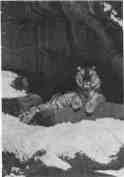FROM THE EDITOR
So, you want to major in leisure... by Ann M. Londrigan Think back to the scene when you told your parents you want to major in leisure studies. How did they react? Were they thrilled for you? I've prompted this flashback for many (now well-educated and prospering) professionals and received common reactions: laughs, snorts, smiles and eyes that roll back in the head. Apparently it was oftentimes a struggle to convince parents that majoring in leisure studies doesn't mean their child wants to pull the ultimate four-year coup, whiling away expensive class hours by playing games, camping out and just taking it easy. The name "leisure studies" doesn't do the field justice today. It conjures up stereotypical images from Plato's era—lounge chairs, grapes and togas. If you talk to a leisure studies grad, however, "Lounging Around on Sofas" was hardly a coursework option. Courses in human and natural resource management, landscaping, teamwork, program and facility management, for example, are diverse and highly challenging. The leisure studies curriculum teaches real life skills and prepares students for work that provides communities with economic and environmental benefits, as well as benefits for individuals (wellness, stress relief, life satisfaction) and the community as a whole (quality of life, community pride and vitality). Universities also grapple with communicating the value of leisure studies. The Department of Leisure Studies at the University of Illinois Urbana-Champaign—recognized as one of the leading departments of its kind in the world—faced near elimination in the early 1990s due to budget cuts and the idea that the coursework was "less central." (See related article on page 27.) With a little logic and thought beyond the stereotypes, it's easy to understand that the field of leisure benefits all of us. 
ON THE COVER This Siberian tiger feels right at home in Chicago's chilly winter climate. Photographed here by Jim Schulz for the Chicago Zoological Society, the majestic animal is one of three Siberian tigers at the Brookfield Zoo, which is owned by the Cook County Forest Preserve District and ranked among the top five zoos in the country. You can see the tigers at night from Nov. 29 to Dec. 22 during "Holiday Magic" with evening hours on Fri., Sat. and Sun. from 4:30 p.m. to 9:00 p.m. For details, contact the Brookfield Zoo at 708/485-0263, ext. 320. 4 * Illinois Parks & Recreation * November / December 1996 |
||||||||||||||
